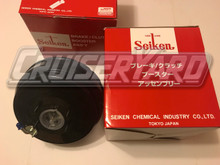bhardesty
1993 FZJ80, 2000 100 Series
I'm trying to get a FZJ80 that's been sitting for 3 years back on the road. 1993 with just under 200k miles and 35's. Here's the work completed on the brakes:
New booster (budget brand)
ABS delete
LSPV delete
All 4 calipers/rotors/pads brand new
Vacuum bled many times
All of this led to a firm, not sinking pedal but lack of braking power, especially noticable with quick deceleration attempts.
I then measured the engine vacuum at 12 inHg (at the intake manifold port for the booster hose). Checked ignition timing and it was 10 degrees retarded! Changed to 6 degrees advanced and that gave me a 15 inHg vacuum reading. Also new intake manifold to booster hose, and timing chain tensioner. Checked for vacuum leaks and didn't find anything obvious.
Braking was much better but still far from right. No way I could make an emergency stop, maybe barely drivable.
MAIN QUESTION:
What are other people's vacuum readings? Is 15 inHg acceptable?
OTHER QUESTIONS:
Any idea how the timing could have changed that much? Sign of timing chain issue? Bad valve timing (separate of ignition timing) would explain this I believe.
Bad booster? It passes all FSM tests and has been replaced and I don't want to throw that kind of $ at it without advice. It is a budget brand though...
Is it possible that the EGR system could cause low vacuum?
Is a compression test the next step? Vacuum readings were steady, I don't suspect major engine issues.
I have a booster check valve and grommet on order, and have a vacuum pump that I can rig up to test the lower vacuum theory.
Thanks for your help!
New booster (budget brand)
ABS delete
LSPV delete
All 4 calipers/rotors/pads brand new
Vacuum bled many times
All of this led to a firm, not sinking pedal but lack of braking power, especially noticable with quick deceleration attempts.
I then measured the engine vacuum at 12 inHg (at the intake manifold port for the booster hose). Checked ignition timing and it was 10 degrees retarded! Changed to 6 degrees advanced and that gave me a 15 inHg vacuum reading. Also new intake manifold to booster hose, and timing chain tensioner. Checked for vacuum leaks and didn't find anything obvious.
Braking was much better but still far from right. No way I could make an emergency stop, maybe barely drivable.
MAIN QUESTION:
What are other people's vacuum readings? Is 15 inHg acceptable?
OTHER QUESTIONS:
Any idea how the timing could have changed that much? Sign of timing chain issue? Bad valve timing (separate of ignition timing) would explain this I believe.
Bad booster? It passes all FSM tests and has been replaced and I don't want to throw that kind of $ at it without advice. It is a budget brand though...
Is it possible that the EGR system could cause low vacuum?
Is a compression test the next step? Vacuum readings were steady, I don't suspect major engine issues.
I have a booster check valve and grommet on order, and have a vacuum pump that I can rig up to test the lower vacuum theory.
Thanks for your help!



